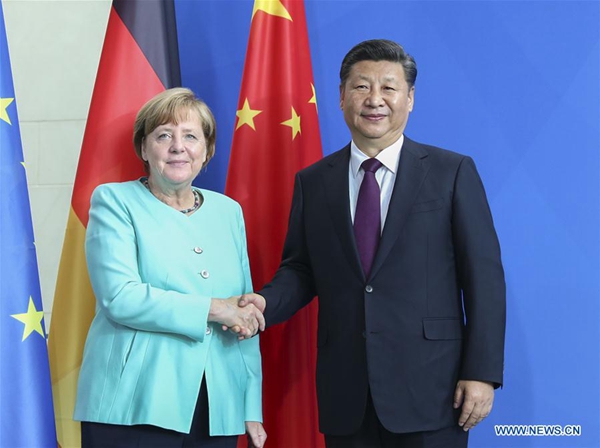Is a Sino-German economic order imminent?
- By Sumantra Maitra
 0 Comment(s)
0 Comment(s) Print
Print E-mail China.org.cn, July 7, 2017
E-mail China.org.cn, July 7, 2017
|
|
|
Chinese President Xi Jinping (R) holds talks with German Chancellor Angela Merkel in Berlin, capital of Germany, July 5, 2017. [Xinhua] |
The news dominating European media right now involves two separate visits setting the scene for the G20 summit in Hamburg.
First, there’s talk of Chinese President Xi Jinping and German Chancellor Angela Merkel promoting a world of free trade without a vestige of economic protectionism, and promotion of the program to deal with climate change. Meanwhile, American President Donald Trump chose Poland as his pre-G20 destination.
Analyzing these two events provides some clues as to the potential direction of the post-2017 G20 world.
The relationship between China and Germany has been flourishing, and now President Xi’s meeting with Chancellor Merkel is expected to highlight a further alignment of the two economic powers, providing a focus for the G20 on fundamental issues in the global economy.
"Chinese-German relations are now about to have a new start needing new breakthroughs," Xi was quoted as telling Reuters. Merkel was a bit more reticent, but accepted that bringing about a consensus between many countries takes efforts, and the joint China-Germany approach to climate change is one such area.
In what is commonly being referred to as “Panda diplomacy,” Merkel and Xi visited the Berlin Zoo enclosure prepared for two on-loan giant pandas, Meng Meng and Jiao Qing, recalling how Sino-U.S. were warmed by pandas thanks to Henry Kissinger visiting China. Ultimately, as always, however, it’s about economics and free trade, with the addition of climate.
This is why Xi’s German visit is exercising the minds of Western media pundits. These media generally detect a genuine alignment, with Merkel and Xi and the new French President Emmanuel Macron leading the new coalition of liberal order.
President Xi said during a telephone conversation with Chancellor Merkel on March 16 this year that “as important economies and staunch supporters of globalization, China and Germany have the responsibility to push other parties to help build an open economy, safeguarding the effectiveness and authority of multilateral trade rules and systems.”
This has become a rallying call for Western media, and is being seen as a symbol of the passing of the mantle of free market globalization Eastward.
Financial diversification has obviously geopolitical overtures. Given how volatile Trump is, and how incoherent his foreign policy has been so far, there’s no guarantee that, tomorrow, there won’t be some form of protectionism slapped on the EU and China.
Hence, a search for new mutually-beneficial markets is prudent. Premier Li Keqiang was also quoted by the South China Morning Post as saying that China remains committed to globalization, given the immense benefits China enjoys. Cooperation in Africa is also on the cards, as is a full-scale trade treaty with the EU.
On the other hand, Trump’s visit in Poland has caused consternation in the liberal media. It is conceded that America has to find an ally in Europe to counterbalance Germany, But Poland?
This is a right-wing son-of-the-soil traditionalist and conservative government within EU. Poland is opposed and equidistant in regard to both Russia and Germany. It is opposed to German liberalism and the pro-migration policy, as well as being a natural power in central Europe.
Poland is also supportive of U.S. sanctions against Russia, something which Germany opposes tooth and nail.
There are caveats of course. Germany is dependent on United States for military security. For all the talk of liberal leadership, that hypothesis would be sorely tested if the U.S. threatens to pull out all its troops from East of the Danube River. Will Germany fill the resultant vacuum? It is unlikely, and Germans know that.
Similarly, Chinese policymakers already know that a German-led EU is a fair-weather friend. Also, they have a different understanding of global norms and human rights, than other great powers. After all, the EU is the most protectionist economic bloc in the entire world, and often piously lectures other powers on human rights.
Nonetheless, there are defining lines forming before the start of the G20 summit. There are countries like Russia, for example, trying to have both détente with the U.S. and alignment with China; however, overall, the lines of protectionist nationalism and open borders globalism are solidifying.
If there is indeed to be a Sino-German-led economic order, as the media seem to think, there will be an urgent need for some appropriate ground rules.
Sumantra Maitra is a columnist with China.org.cn. For more information please visit:
http://www.ccgp-fushun.com/opinion/SumantraMaitra.htm
Opinion articles reflect the views of their authors only, not necessarily those of China.org.cn.






